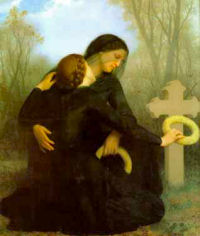Day 310 - The Crucifixion (Part II)
Today’s Reading: John 19:23-30
23 When the soldiers had crucified Jesus they took his garments and made four parts, one for each soldier; also his tunic. But the tunic was without seam, woven from top to bottom; 24 so they said to one another, “Let us not tear it, but cast lots for it to see whose it shall be.” This was to fulfill the Scripture,
“They parted my garments among them, and for my clothing they cast lots.”
25 So the soldiers did this. But standing by the cross of Jesus were his mother, and his mother’s sister, Mary the wife of Clopas, and Mary Mag’dalene. 26 When Jesus saw his mother, and the disciple whom he loved standing near, he said to his mother, “Woman, behold, your son!” 27 Then he said to the disciple, “Behold, your mother!” And from that hour the disciple took her to his own home. 28 After this Jesus, knowing that all was now finished, said (to fulfill the Scripture), “I thirst.” 29 A bowl full of vinegar stood there; so they put a sponge full of the vinegar on hyssop and held it to his mouth. 30 When Jesus had received the vinegar, he said, “It is finished”; and he bowed his head and gave up his spirit.
Today’s Commentary
his mother’s sister: Possibly “Salome”, the mother of the apostles James and John, the sons of Zebedee (Mt 27:56; Mk 15:40).
Woman: The address sounds impersonal to modern readers but was considered polite in biblical antiquity. Jesus probably alludes to Gen 3:15, which describes the mother of the Messiah as the “woman” whose offspring conquers the devil.
The Word Among Us
Meditation: Romans 15:14-21
31st Week in Ordinary Time
I myself am convinced about you, my brothers and sisters, that you yourselves are full of goodness. (Romans 15:14)
A strange movement that began in the late 1990s has gained popularity in recent years. The premise is simple: strangers assemble in theaters, bars, and church halls to perform dramatic readings of old diary entries, love letters, and poems. The excerpts range from hilarious to moving to painfully awkward, but one element that most have in common is how direct they are—especially the ones written by children and teenagers!
Look at how direct St. Paul was with the believers in Rome! We may be accustomed to using the term “brothers and sisters” in a church setting, but think about how this would have come across to the original recipients. Paul, a faithful Jew, is calling Gentiles his family?! He is warm and kind to these Romans, almost scandalously so. What’s more, in blunt language he praises them for what they are getting right and corrects them for their mistakes. And these are people he has not even met!
Paul enjoyed being part of an international, multicultural, growing Church. He saw people from so many different backgrounds come to faith through the power of the Holy Spirit, and that’s what gave him the confidence to speak so boldly. He was convinced that this was God’s work, and so God would sustain it.
The Holy Spirit wants to convince us that God is at work today just as powerfully as he was in Paul’s day. He wants to urge us to try to advance the mission of the Church. He wants to tell us the same thing Pope John Paul II said over and over again: “Do not be afraid!”
We may not feel as talented as the apostle Paul, but it’s not too hard for us to speak an encouraging word to a friend. It’s not hard to offer to pray for a neighbor or relative facing a medical crisis. It’s not impossible to forgive a co-worker who has hurt us.
We are a Church on a mission. As Pope Francis has said, sometimes that means going beyond our parish boundaries so that we can draw more people in. May we all commit to building the Church, confident that God is with us, sustaining us at every step.
“Lord, fill me with love for your Church and confidence in your work in it.”
Psalm 98:1-4
Luke 16:1-8
1. And he said to his disciples, There was a certain rich man, which had a steward; and the same was accused to him that he had wasted his goods.
2. And he called him, and said to him, How is it that I hear this of you? give an account of your stewardship; for you may be no longer steward.
3. Then the steward said within himself, What shall I do? for my lord takes away from me the stewardship: I cannot dig; to beg I am ashamed.
4. I am resolved what to do, that, when I am put out of the stewardship, they may receive me into their houses.
5. So he called every one of his lord's debtors to him, and said to the first, How much owe you to my lord?
6. And he said, An hundred measures of oil. And he said to him, Take your bill, and sit down quickly, and write fifty.
7. Then said he to another, And how much owe you? And he said, A hundred measures of wheat. And he said to him, Take your bill, and write fourscore.
BEDE; Having rebuked in three parables those who murmured because He received penitents, our Savior shortly after subjoins a fourth and a fifth on almsgiving and frugality, because it is also the fittest order in preaching that almsgiving should be added after repentance. Hence it follows, And he said to his disciples, There was a certain rich man.
PSEUDO. There is a certain erroneous opinion inherent in mankind, which increases evil and lessens good. It is the feeling that all the good things we possess in the course of our life we possess as lords over them, and accordingly we seize them as our especial goods. But it is quite the contrary. For we are placed in this life not as lords in our own house, but as guests and strangers, led whither we would not, and at a time we think not of. He who is now rich, suddenly becomes a beggar. Therefore whoever you are, know yourself to be a dispenser of the things of others, and that the privileges granted you are for a brief and passing use. Cast away then from your soul the pride of power, and put on the humility and modesty of a steward.
BEDE; The bailiff is the manager of the farm, therefore he takes his name from the farm. But the steward, or director of the household, is the overseer of money as well as fruits, and of every thing his master possesses.
AMBROSE; From this we learn then, that we are not ourselves the masters, but rather the stewards of the property of others.
THEOPHYL. Next, that when we exercise not the management of our wealth according to our Lord's pleasure, but abuse our trust to our own pleasures, we are guilty stewards. Hence it follows, And he was accused to him.
PSEUDO-CHRYS. Meanwhile he is taken and thrust out of his stewardship; for it follows, And he called him, and said to him, What is this that I hear of you? give an account of your stewardship, for you can be no longer steward. Day after day by the events which take place our Lord cries aloud to us the same thing, showing us a man at midday rejoicing in health, before the evening cold and lifeless; another expiring in the midst of a meal. And in various ways we go out from our stewardship; but the faithful steward, who has confidence concerning his management, desires with Paul to depart and be with Christ. But he whose wishes are on earth is troubled at his departing.
Hence it is added of this steward, Then the steward said within himself, What shall I do, for my Lord takes away from me the stewardship? I cannot dig, to beg I all ashamed. Weakness in action is the fault of a slothful life. For no one would shrink who had been accustomed to apply himself to labor. But if we take the parable allegorically, after our departure hence there is no more time for working; the present life contains the practice of what is commanded, the future, consolation. If you have done nothing here, in vain then are you careful for the future, nor will you gain any thing by begging. The foolish virgins are an instance of this, who unwisely begged of the wise, but returned empty. For every one puts on his daily life as his inner garment; it is not possible for him to put it off or exchange it with another.
But the wicked steward aptly contrived the remission of debts, to provide for himself an escape from his misfortunes among his fellow-servants; for it follows, I am resolved what to do, that when I am put out of the stewardship, they may receive me into their houses. For as often as a man perceiving his end approaching, lightens by a kind deed the load of his sins, (either by forgiving a debtor his debts, or by giving abundance to the poor,) dispensing those things which are his Lord's, he conciliates to himself many friends, who will afford him before the judge a real testimony, not by words, but by the demonstration of good works, nay moreover will provide for him by their testimony a resting-place of consolation. But nothing is our own, all things are in the power of God.
Hence it follows, So he called every one of his Lord's debtors to him, and said to the first, How much owe you to my Lord? And he said, A hundred casks of oil.
BEDE, A cadus in Greek is a vessel containing three urns. It follows, And he said to him, Take your bill, and sit down quickly, and write fifty, forgiving him the half.
It follows, Then said he to another, And how much owe you? And he said, A hundred measures of wheat. A corus is made up of thirty bushels. And he said to him, Take your bill, and write fourscore, forgiving him a fifth part. It may be then simply taken as follows: whosoever relieves the want of a poor man, either by supplying half or a fifth part, will be blessed with the reward of his mercy.
AUG. Or because out of the hundred measures of oil, he caused fifty to be written down by the debtors, and of the hundred measures of w heat, fourscore, the meaning thereof is this, that those things which every Jew performs toward the Priests and Levites should be the more attendant in the Church of Christ, that whereas they give a tenth, Christians should give a half, as Zaccheus gave of his goods, or at least by giving two tenths, that is, a fifth, exceed the payments of the Jews.
8. And the lord commended the unjust steward, because he had done wisely: for the children of this world are in their generation wiser than the children of light.
AUG. The steward whom his Lord cast out of his stewardship is nevertheless commended because he provided himself against the future. As it follows, And the Lord commended the unjust steward, because he had done wisely; we ought not however to take the whole for our imitation. For we should never act deceitfully against our Lord in order that from the fraud itself we may give alms.
ORIGEN; But because the Gentiles say that wisdom is a virtue, and define it to be the experience of w hat is good, evil, and indifferent, or the knowledge of what is and what is not to be done, we must consider whether this word signifies many things, or one. For it is said that God by wisdom prepared the heavens. Now it is plain that wisdom is good, because the Lord by wisdom prepared the heavens. It is said also in Genesis, according to the LXX, that the serpent was the wisest animal, wherein he does not make wisdom a virtue, but evil-minded cunning. And it is in this sense that the Lord commended the steward that he had done wisely, that is, cunningly and evilly. And perhaps the word commended was spoken not in the sense of real commendation, but in a lower sense; as when we speak of a man being commended in slight and indifferent matters, and in a certain measure clashings and sharpness of wit are admired, by which the power of the mind is drawn out.
AUG. On the other hand this parable is spoken that we should understand that if the steward who acted deceitfully, could be praised by his lord, how much more they please God who do their works according to His commandment.
ORIGEN; The children of this world also are not called wiser but more prudent than the children of light, and this not absolutely and simply, but in their generation. For it follows, For the children of this world are in their generation wiser than the children of light, &c.
BEDE; The children of light and the children of this world are spoken of in the same manner as the children of the kingdom, and the children of hell. For whatever works a man does, he is also termed their sun.
THEOPHYL. By the children of this world then He means those who mind the good things which are on the earth; by the children of light, those who beholding the divine love, employ themselves with spiritual treasures. But it is found indeed in the management of human affairs, that we prudently order our own things, and busily set ourselves to work, in order that when we depart we may have a refuge for our life; but when we ought to direct the things of God, we take no forethought for what shall be our lot hereafter.
Catena Aurea Luke 16





 In the eleventh century his cult rapidly spread, at first through Frankish lands, following the release of Bohemond I of Antiochin 1103 from a Danishmend prison. Bohemond, a charismatic leader of the First Crusade, subsequently visited the Abbey of Noblac, where he made an offering in gratitude for his release. Bohemund's example inspired many similar gifts, enabling the Romanesque church and its visible landmark belltower to be constructed. About the same time Noblac was becoming a stage in the pilgrimage route that led towards Santiago de Compostela. Leonard's cult spread through all of Western Europe: in England with its cultural connections to the region, no fewer than 177 churches are dedicated to him. Leonard was venerated in the Low Countries, Spain, Italy, Switzerland, Germany, particularly in Bavaria, and also in Bohemia, Poland, and elsewhere. Pilgrims and patronage flowed to Saint-Leonard de Noblac. Leonard or Lienard became one of the most venerated saints of the late Middle Ages. His intercession was credited with miracles for the release of prisoners, women in labour and the diseases of cattle. His feast day is 6th November, when he is honoured with a festival at Bad Tölz, Bavaria.
In the eleventh century his cult rapidly spread, at first through Frankish lands, following the release of Bohemond I of Antiochin 1103 from a Danishmend prison. Bohemond, a charismatic leader of the First Crusade, subsequently visited the Abbey of Noblac, where he made an offering in gratitude for his release. Bohemund's example inspired many similar gifts, enabling the Romanesque church and its visible landmark belltower to be constructed. About the same time Noblac was becoming a stage in the pilgrimage route that led towards Santiago de Compostela. Leonard's cult spread through all of Western Europe: in England with its cultural connections to the region, no fewer than 177 churches are dedicated to him. Leonard was venerated in the Low Countries, Spain, Italy, Switzerland, Germany, particularly in Bavaria, and also in Bohemia, Poland, and elsewhere. Pilgrims and patronage flowed to Saint-Leonard de Noblac. Leonard or Lienard became one of the most venerated saints of the late Middle Ages. His intercession was credited with miracles for the release of prisoners, women in labour and the diseases of cattle. His feast day is 6th November, when he is honoured with a festival at Bad Tölz, Bavaria.